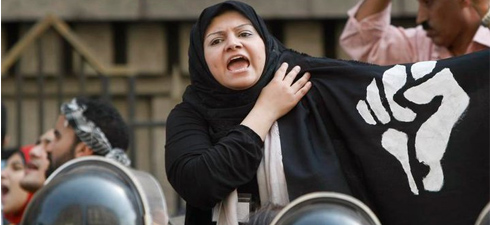The organisation dubbed by some commentators as "Revolution Ltd" has trained activists and non-violent resistants who have struggled to overthrow most of the world’s dictatorial regimes. Its methods have served as "weapons" almost everywhere: from the Rose Revolution in Georgia [2003] to the Tulip Revolution in Kyrgyzstan [2005], and more recently in the revolt that has swept across the Arab world.
"Yes, it’s true. We did train members of the April 6 Youth Movement in Egypt," remarks Srdja Popovic, who now runs the Center for Applied Nonviolent Action and Strategies (CANVAS) in Belgrade, whose senior members are veterans of the Otpor! civil resistance movement.
However, Srdja Popovic has no intention of hogging the limelight and appears exasperated when we ask him if Otpor! is an exporter of revolutions. "We do not descend on countries with revolution in a suitcase. It is their revolution and the foreign consultants should not take credit for it. These people risked their lives for freedom, and their victory is 100% of their own making. No question about it!"
Always the emphasis on non-violence
Srdja Popovic is long-standing authority on civil disobedience and non-violent resistance. In 1998, when he was a 25-year old biology student, he and a dozen of his friends founded Otpor!. At the time, Milosevic had been in power for almost ten years and was preparing to wage war Kosovo.
In a student canteen in Belgrade University, they devised a plan for a new resistance movement, inspired by Mahatma Gandhi and the campaign against apartheid, with a fresh and trendy image that even succeeded in attracting their apolitical peers.
Highly imaginative initiatives, which brought them increasing attention in the media, became their signature. As always the emphasis was on non-violence: they challenged and ridiculed the regime, but confronted soldiers and police carrying flowers. Otpor! had understood that Milosevic would fall when he could no longer rely on the unquestioning support of the police and the army.
"They were the methods and the message that we are now teaching to activists in other countries," explains Srdja Popovic. "In our courses, we ask them to identify the pillars of the regime. Then we tell them: 'Do not attack them, because that will only lead to violence. Try to win them over to your side'".
People power is the decisive factor
From the start of the uprising against Hosni Mubarak, members of the April 6 Youth Movement brandishing the Otpor! symbol of a clenched white fist on a black background were a visible presence in Tahrir Square and the streets of Cairo. In an interview with Al-Jazeera, one of their number, 22-year-old blogger Mohammed Adel explained: "I was in Serbia where I learned about the organisation of non-violent demonstrations and the best methods to counter security service brutality."
When he returned to Egypt at the end of 2009, he brought with him a guide to subversive activities, which he distributed to other members of the April 6 and Kefaya movements. A little more than a year later, this document was put to good use.
Srdja Popovic affirms that "people power" is the decisive factor. No two revolutions are the same, but there is an arsenal of tools that can be put to use everywhere. For the Serbian activist, "Every regime, even the most repressive ones, can be over thrown by non-violent means."
Do you like our work?
Help multilingual European journalism to thrive, without ads or paywalls. Your one-off or regular support will keep our newsroom independent. Thank you!












